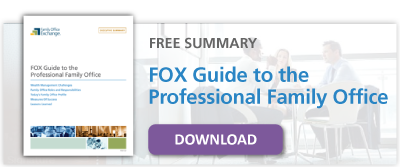Nine Reasons to Start a Private Family Trust Company

What is a Private Family Trust Company?
A private family trust company (PFTC) is a state-chartered entity designed to provide fiduciary services to members of a family. PFTC is distinct from a “family office” in that it can serve as a fiduciary under state law.
Private family trust companies can take on many responsibilities commonly performed by the family office, including investment and financial management, accounting, and recordkeeping. They can also operate separately from the family office, while still relying on it for administrative and back office support through a service contract.
Private Family Trust Company Advantages
Every family has its own reasons for establishing a PFTC, but some of the primary advantages include:
- A permanent trustee that can adapt to changing family dynamics over time, as opposed to an individual trustee, which oftentimes presents succession concerns.
- Consistency and continuity of a trustee that is knowledgeable about the family. Since the PFTC serves as trustee and the board of directors includes several trusted advisors with, ideally, differing ages/tenures, it preserves an advantageous “institutional memory.”
- Enhanced flexibility and control over decision making. Families can choose board members, draft policies and procedures, structure the organization to suit their needs, obtain voting power for important decisions, and arrange the distribution process to their liking.
- The ability to contribute to the investment and asset management process through participation on the investment committee of the PFTC. In addition, families can be more involved in the drafting of the investment and asset management policies and procedures. This level of involvement is unlike that of a traditional trustee.
- Acting through directors/officers and errors/omissions insurance provides increased liability protection for decision makers. In addition, in regulated states, it is more difficult to pierce the corporate veil.
- Better decision-making with respect to closely held and family owned assets by involving multiple trusted advisors, including lawyers, accountants, investment managers, and others who are intimately familiar with family assets.
- Greater control over trustee fees and costs through ownership, involvement, and decision making in the PFTC.
- Enhanced privacy. The family has more control over the PFTC and the disbursement of information. A large institution is not involved in the day-to-day administration, and there are fewer people privy to family issues and concerns. In addition, some states have laws that reflect this privacy concern. South Dakota, for example, has a total seal forever upon filing of all trust documents.
- Ability to integrate the next generation in administration of the family enterprise through involvement in board meetings, committees, and decision making. This level of involvement is unlike that of a traditional trustee situation where family involvement can be somewhat limited.
Families that utilize a family office structure are well-equipped to transition to a PFTC structure. The families can choose their long-time trusted advisors to run the private family trust company, all while concurrently integrating the next generation into the family’s wealth planning and management.
About Matt Tobin

About Tom Cota

